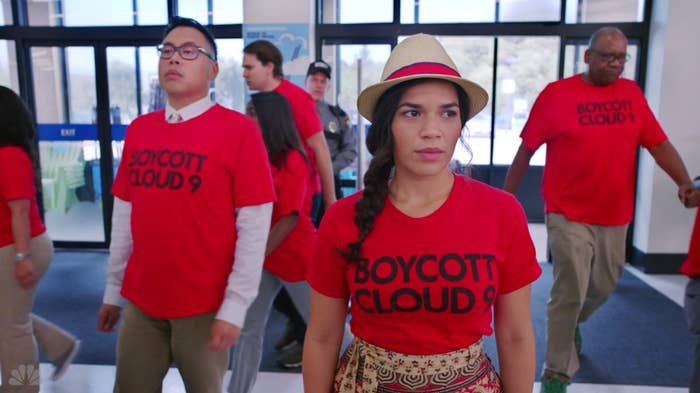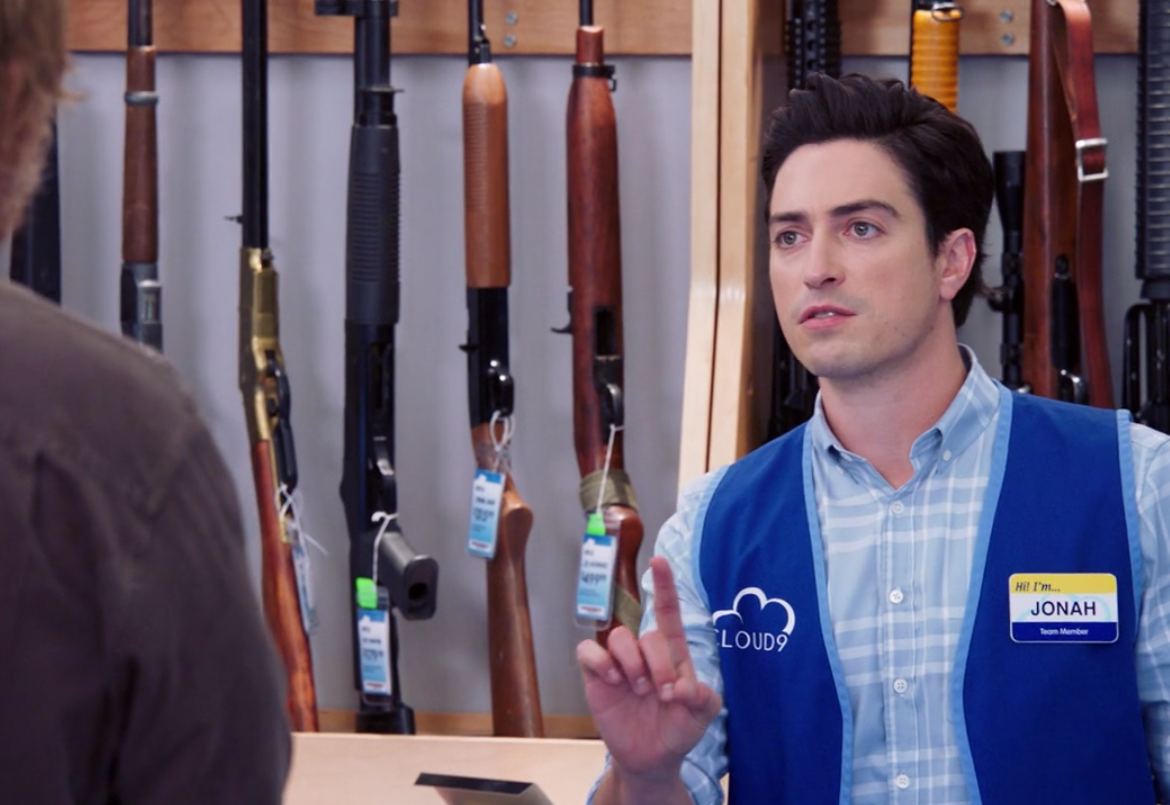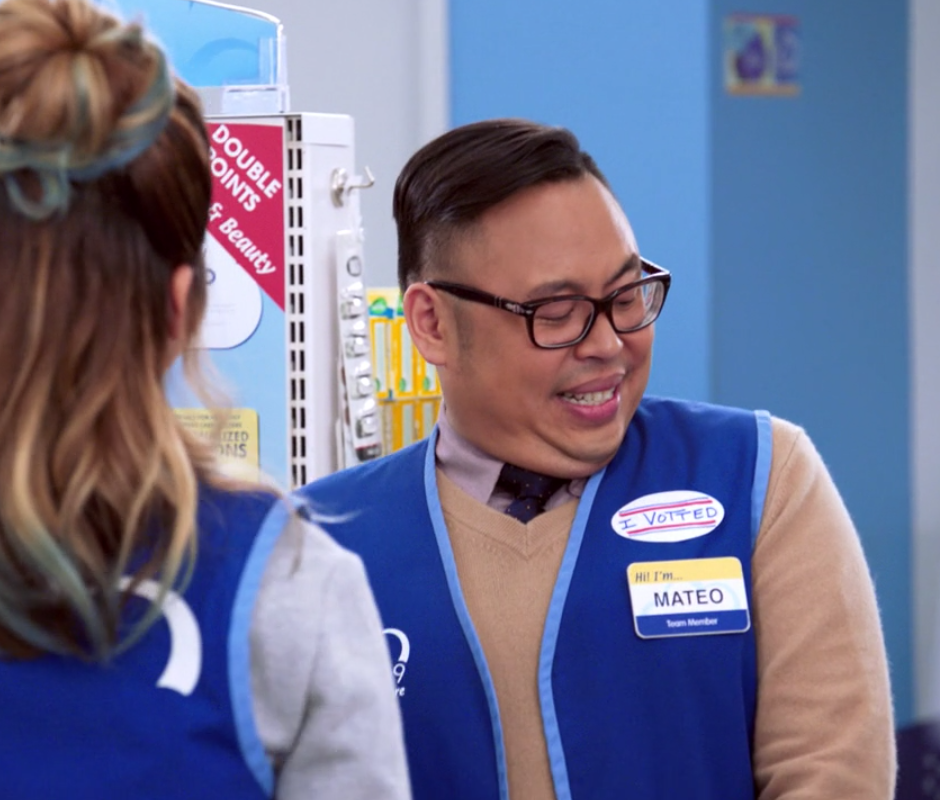
In August 2016, NBC’s workplace sitcom Superstore aired a special episode during the Summer Olympics. In one early scene, cheerful store manager Glenn (Mark McKinney) questions an employee, Mateo (Nico Santos), about why he’s wearing a pin of the Philippine flag. “I do love America, but the Philippines is also great,” Mateo says.
“Yeah, of course, absolutely,” Glenn replies. “Just that, technically, America is number one.”
“Glenn, what do you mean, ‘technically’?” America Ferrera’s character, Amy, interjects.
“Just as a fact,” Glenn says. “That’s the saying: ‘America’s number one.’”
“But other countries believe that they’re number one,” Ben Feldman’s character, Jonah, retorts.
“But America is number one,” Glenn says. “’Cause it’s first in the world.”
“First in the world in what?” Mateo asks.
“Being the best,” Glenn responds. “Being number one. Of countries. And planets.”
Superstore manages a tricky feat:
It’s a sharp reflection
of American political rhetoric and
a pleasurable escape from the horrors
of it.
The scene captures what Superstore does best. Grounded in the über-American setting of fictionalized big-box store Cloud 9 — think Walmart or Target — Superstore manages a tricky feat: It’s a sharp reflection of American political rhetoric and a pleasurable escape from the horrors of it. From the aforementioned display of American exceptionalism to spotlights on everything from gun violence to life as an undocumented immigrant — among other oft-discussed political subjects — Superstore captures a cross-section of identity and ideologies that are inescapable in current American news cycles. It does so, in part, thanks to the rich narrative ground of working-class Middle America, and the diverse and charming cast of characters that come from mining it. The show understands the inherent comedy, drama — and, yes, politics — of everyday working-class life.
“Having our characters talking about what people in the real world are talking about at the moment makes it feel more current and real,” Superstore executive producer Gabe Miller told BuzzFeed News. “When an issue comes up, we try to consider it from all sides, and have all sides represented,” he said. “And because we’re looking for the funniest take on things, we’ll often have people be equally ridiculous from all angles.”
To capture those angles, Superstore’s characters are made up of a range of races, ages, sexual orientations, body types, and outlooks. Out of that range comes the wealth of plots that have made the show’s first two seasons so fruitful. “I knew I wanted a very diverse group of people,” Superstore’s creator, Justin Spitzer, said. “I don’t mean necessarily racially, although that’s cool if that’s a part of it. But [we just wanted] diverse perspectives on things.”
There’s Amy (Ferrera), a cynical young mom who got a job at Cloud 9 a decade ago to support her family, and who’s taking college classes on the side to try to move her life forward; Mateo (Santos), an ambitious young gay man trying to move up within Cloud 9 while also hiding his status as undocumented; Cheyenne (Nichole Bloom), a sweet teen girl who gives birth in Season 1's finale and is navigating a new reality Amy lived years ago; Dina (Lauren Ash), the authoritarian assistant manager who also happens to be vegan and an animal lover; and Garrett (Colton Dunn), a chill, sardonic man who’s been carrying on a casual sex arrangement with Dina. He also uses a wheelchair — though the actor who plays him does not, a point of contention for advocates who campaign for more roles for actors with disabilities.

Also central to the series are Jonah (Feldman) — a newer addition to the store and an idealist who’s constantly worried those around him will think he’s elitist — and Glenn (McKinney), the longtime store manager, whose optimism and hope for the store and its employees are seemingly never-ending. They’re also both intensely earnest in their beliefs — but the former a satire of white liberalism and the latter of white Christian conservatism.
In a Season 2 episode called “Guns, Pills, and Birds,” Jonah tries to opt out of a shift selling guns at the Cloud 9 gun counter. According to Spitzer, the writers room wanted to do an episode about “what happens when your job requires you to do something that you have moral problems with.” Jonah, with what Spitzer refers to as his “East Coast liberal fear of guns,” fit the storyline perfectly — and helped inspire another important part of the episode. “From [Jonah], we started talking about what other employees might have moral problems with something in the store,” Spitzer said. Soon Glenn took up the episode’s B story, buying up the store’s entire stock of the morning-after pill to keep it off the shelves — and then immediately trying to sell it back to customers when he realizes how expensive his moral quest is.
“We never want to feel like we’re proselytizing,” Spitzer said. “We’re not trying to teach anyone a lesson.” It’s a sentiment his coworkers echo. “We want to avoid being either preachy or it feeling academic,” Miller said. And as fellow executive producer Jonathan Green put it, “Our way in is always through these characters. We’re not ever looking for, like, ‘the show needs to make a statement about this.’”
That careful line they walk may at times hold them back from fully fleshing out the topics they choose to take on. The format itself plays into this, too: You can only dive so far into gun control or the morning-after pill debate in a time span of 22 minutes of light comedy — especially when you’re trying not to alienate any big political demographics. With this in mind, time and again Superstore integrates relevant slices of American political life into the fabric of the show. In the “Election Day” episode, which aired five days before the 2016 presidential election, the characters dealt with a polling place being set up in the store.
“We had a lot of conversations about how specific we could be,” Spitzer said of how the writers grappled with what was, from all sides, a contentious time to say the least. “That was definitely an area where we didn’t want to get too literally political; we would [out] of necessity be alienating 40% of our audience, whether we took one point of view or another.”

Their solution, in the case of “Election Day,” was to focus on a local election in their fictional Missouri district — and on how individual characters would spin out in reaction to it. Amy and Jonah spent the episode campaigning for a pro-Labor candidate after discovering propaganda from his anti-Labor opponent had been left in all the employee lockers. Dina and Glenn accidentally destroy some ballots and spend the episode trying to cover it up for fear of jail time for election tampering. Meanwhile, Mateo — who found out in the Olympics episode that his family had been lying to him and that he is actually undocumented — is trying his darnedest to get an “I Voted” sticker so no one will suspect he’s not an American citizen.
Mateo’s story required the most care from the writers. In their initial conception of the episode, Mateo still wanted the sticker — but he actually tried to vote to get it. “We were aware that if we hit that too hard and he actually tried to vote, or did vote — and for a while that was the story — that we would as a show be saying, ‘Oh, undocumented people really do vote,’ or ‘This really is a fear [to have] out there,’” Spitzer said. “Any time you have a sensitive topic like that, even if you’re not intending to convey any message, you need to be aware that sometimes you are, whether you want to or not.” So they took Mateo trying to vote out of the episode, but left the “I Voted” sticker bit in, as part of the season’s ongoing story of Mateo’s fear of being discovered and uprooted because of his immigrant status.
Around this time, the writers consulted with Define American, a nonprofit that reached out to them after seeing the beginnings of Mateo’s story unfold onscreen. The organization’s website says its mission is to use “the power of story to transcend politics and shift the conversation about immigrants, identity, and citizenship in a changing America.” As Green said, “It’s all about wanting to get it right, and be as real as possible. So we have the germ of an idea for something, and [we’ll ask ourselves] how this actually plays out in the real world.”
With Mateo’s story, and every other instance where Superstore deals with hot-button everyday matters, the show lives its credo. As Spitzer put it, “You can’t be flip about some of these issues, but I think you can still find the humor in them.”
From the daily lives of working-class people in Middle America, the show dances through stories rooted in joy, pain, and, especially, irreverence.
“There is a small, silent revolution in pointing the camera at the common person who is not saving the world or the world’s best FBI agent, but who is just getting by and finding the humor and the love and the stakes and the victories and the tragedies in everyday life,” Ferrera told Vulture in March.
Superstore revels in that space. From the daily lives of working-class people in Middle America, the show dances through stories rooted in joy, pain, and, especially, irreverence. Superstore demonstrates that, more often than not, those everyday trials, tribulations, and hang-ups will intersect with the larger political conversations that consume people in any zip code or in any income bracket in the United States and beyond. “I don’t think comedy exists without commentary,” Ferrera told Vulture. “There has to be a truth to it to make us recognize it.”
Superstore constantly acknowledges that there’s plenty of strangeness to the truth. “You see things in real life that seem so crazy, that seem like they wouldn’t happen in real life,” Spitzer said. “You see things in stores that are so absurd, and yet also real. I think that’s our sweet spot of comedy.”
